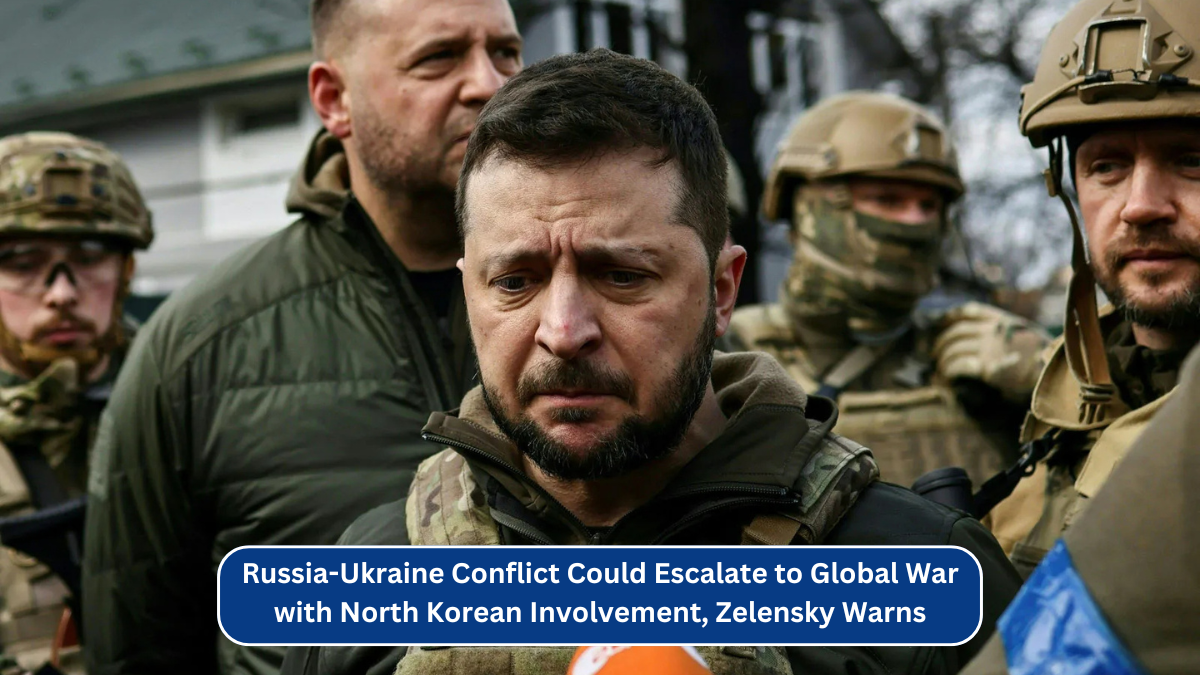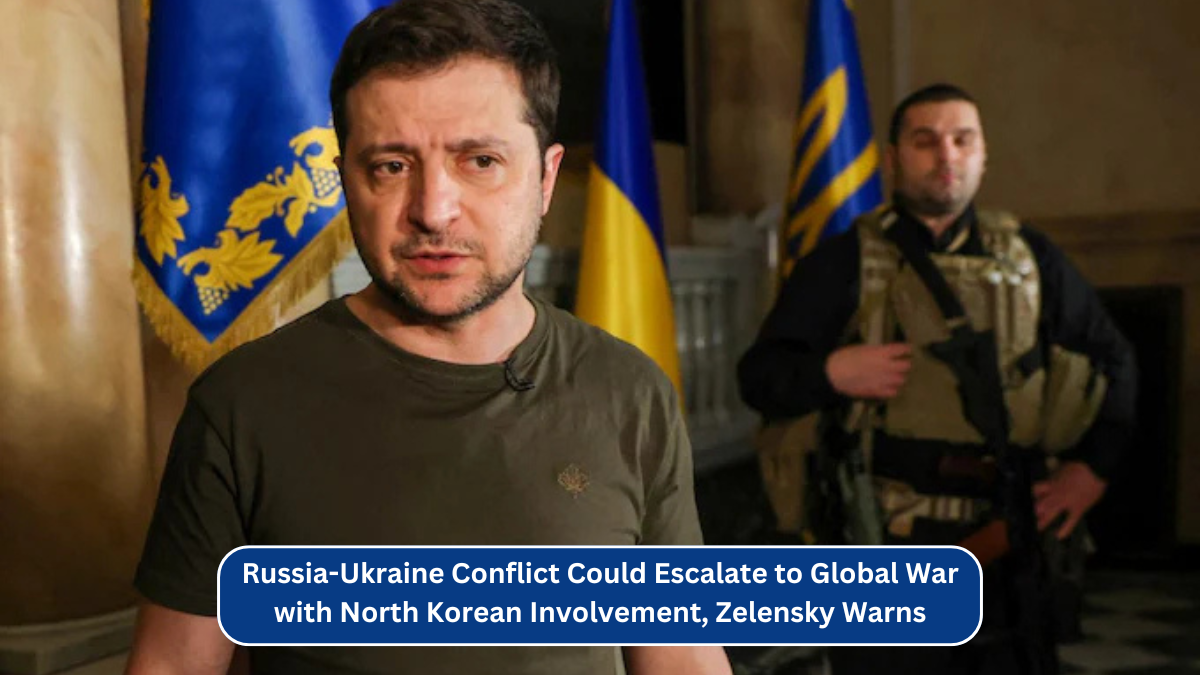The ongoing Russia-Ukraine war, which has already impacted Europe and the broader global stage, could take a dark and dangerous turn as Ukrainian President Volodymyr Zelensky warns of potential escalation if North Korean troops are brought into the conflict. His recent statements shed light on a worrying scenario, where a regional war could evolve into a worldwide crisis involving multiple nations and alliances.
This possibility has sent shockwaves through international corridors of power, triggering discussions among military analysts, political experts, and diplomats about the global implications of such an event. The inclusion of North Korean forces would not only heighten the conflict but could potentially pull in other countries, drawing the world into a far more dangerous geopolitical standoff.
The Growing Concern: North Korean Troops Supporting Russia
Ukraine’s concerns stem from growing intelligence reports and signals that North Korea may be preparing to send military personnel to support Russia. For months, Moscow and Pyongyang have been strengthening their ties, with talks of arms sales and mutual support. If North Korea were to officially deploy its soldiers in Ukraine, this move would likely signal a new phase in the war and shift the balance of power on the battlefield.
Military experts warn that North Korea’s involvement would significantly complicate the situation. North Korean soldiers are known for their loyalty, discipline, and harsh training conditions, making them formidable forces on the ground. The introduction of these troops could push the Ukrainian front lines, forcing NATO countries and other Western powers to reconsider their level of involvement and military support for Ukraine.
Strategic Implications of North Korean Involvement
Bringing North Korean troops into the mix would not just be a game-changer for military strategy in Eastern Europe, but it would also have far-reaching implications for global security. North Korea’s leader, Kim Jong-un, has long maintained a close relationship with Russian President Vladimir Putin, and any form of military support to Moscow could set a dangerous precedent.
This new alliance could lead to increased military cooperation between Russia, North Korea, and possibly China, altering the dynamics of the global balance of power. Such a scenario would not only place immense pressure on Ukraine but also on NATO and the European Union, which would have to confront a more complex and well-equipped adversary.
Moreover, the involvement of North Korea would complicate diplomatic efforts aimed at ending the conflict. Countries that have remained neutral or have only provided humanitarian aid could be forced to choose sides, escalating the tension further. Economic sanctions, which are already in place against both Russia and North Korea, would likely intensify, further destabilizing the global economy.
Zelensky’s Dire Warning: The Risk of a Global Conflict
Zelensky’s warning is not without merit. The Ukraine-Russia conflict has already drawn in significant international attention, with NATO countries supplying arms, intelligence, and financial support to Ukraine. In contrast, Russia has received backing, though limited, from countries like China and Iran. The inclusion of North Korea in the conflict would further polarize the world, increasing the likelihood of a broader confrontation.
The Ukrainian president has consistently called for international solidarity, and his latest warning is part of a broader appeal to ensure that the war remains contained within the current geographical limits. His concerns are primarily focused on the potential for the conflict to spiral out of control and involve other major global powers, such as the United States, China, and European nations, directly.
Global Security and the Fragile Balance
A large-scale war that involves multiple countries could have catastrophic consequences for global security. The rise in nuclear tensions, cyber warfare, and economic warfare would create a ripple effect throughout international markets and political systems. Zelensky’s warnings aim to prevent such an outcome, urging the international community to recognize the dangers of unchecked escalation.
The war between Russia and Ukraine has already caused severe humanitarian crises, economic instability, and geopolitical shifts. A global war would exacerbate these issues, threatening to undo decades of international cooperation and peacekeeping efforts. Moreover, the involvement of nuclear-capable nations such as North Korea raises concerns about the potential use of weapons of mass destruction.
The Role of the United Nations and Other Global Institutions
The potential involvement of North Korea in the Russia-Ukraine conflict puts organizations like the United Nations (UN) in a challenging position. The UN, which has largely focused on humanitarian efforts, would be forced to address the growing military alliances forming around the conflict. Efforts to broker peace or at least reduce the intensity of the conflict could be severely hampered by the introduction of new state actors with aggressive agendas.
Diplomatic channels could also be at risk. Countries like the United States, which have historically engaged in delicate diplomacy with North Korea, may find these efforts nullified if North Korean forces enter the Ukraine battlefield. Similarly, Russia’s diplomatic relationships with Western countries would deteriorate further, pushing global powers towards more direct confrontations.
NATO’s Position in the Escalating Conflict
NATO’s role in the Russia-Ukraine war has always been a delicate balancing act, with the alliance offering support to Ukraine while avoiding direct military confrontation with Russia. However, if North Korean troops become involved, the dynamics could change rapidly. NATO countries, particularly those in Eastern Europe, could be forced to ramp up their military presence and readiness, fearing that the conflict could spill over into their territories.
An escalation involving North Korea might lead NATO to reconsider its current strategy of indirect support. Zelensky has repeatedly called for stronger NATO backing, and this new development could bring the alliance closer to more active involvement. This scenario would risk a direct confrontation between nuclear-armed powers, something NATO has been trying to avoid since the conflict began.
Conclusion
Zelensky’s warnings are a stark reminder that the Russia-Ukraine war is not just a regional conflict—it has the potential to evolve into a global crisis. The involvement of North Korean troops could tip the balance and bring the world to the brink of a much larger and deadlier war. The implications of such an escalation are far-reaching, with consequences for global security, diplomatic relations, and economic stability.
As the conflict continues to evolve, it is crucial for world leaders and international organizations to remain vigilant and proactive in addressing the risks of escalation. The war has already tested the resolve of the international community, and the introduction of new military actors like North Korea could push the world closer to a tipping point that few are prepared to face.

